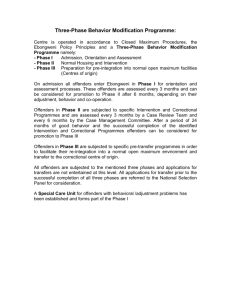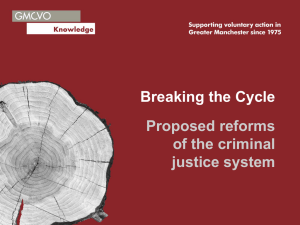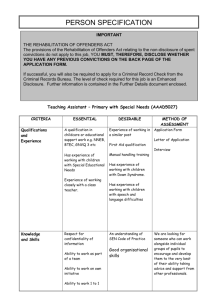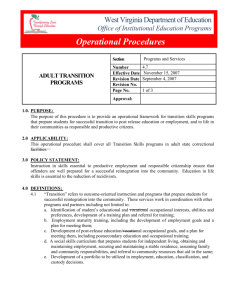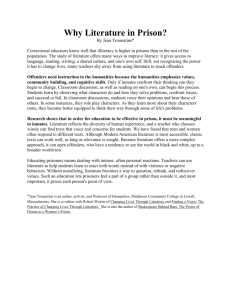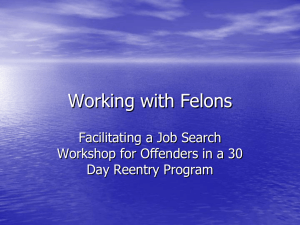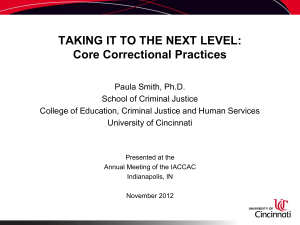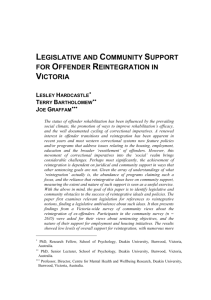mangaung private prison : 2009/08/13
advertisement
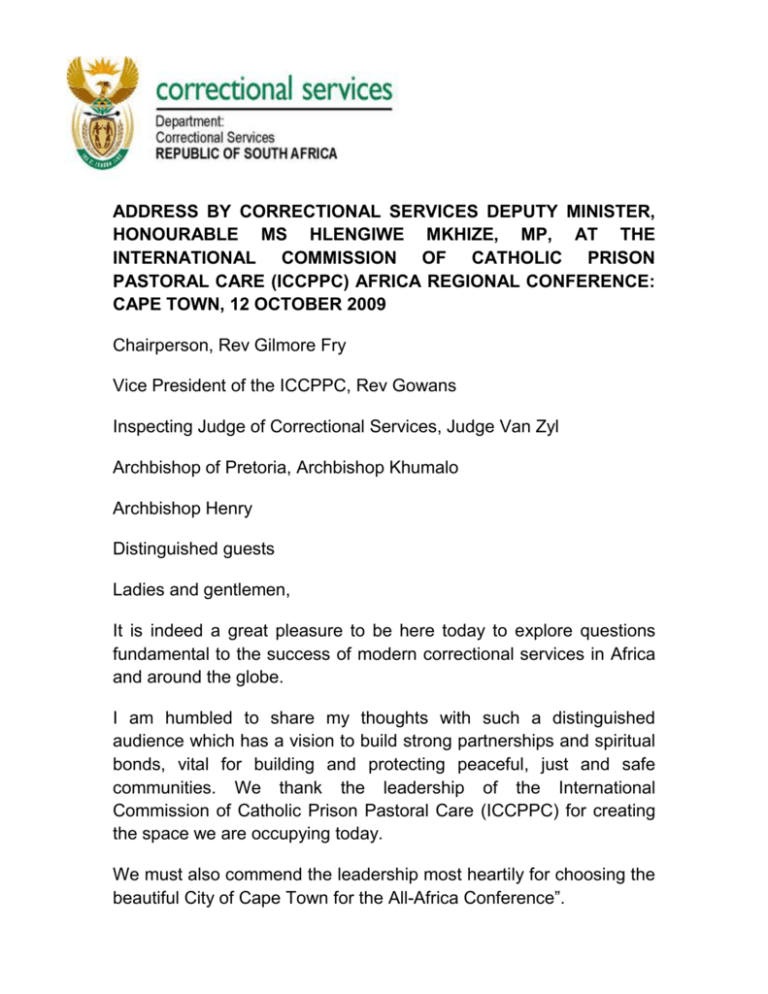
ADDRESS BY CORRECTIONAL SERVICES DEPUTY MINISTER, HONOURABLE MS HLENGIWE MKHIZE, MP, AT THE INTERNATIONAL COMMISSION OF CATHOLIC PRISON PASTORAL CARE (ICCPPC) AFRICA REGIONAL CONFERENCE: CAPE TOWN, 12 OCTOBER 2009 Chairperson, Rev Gilmore Fry Vice President of the ICCPPC, Rev Gowans Inspecting Judge of Correctional Services, Judge Van Zyl Archbishop of Pretoria, Archbishop Khumalo Archbishop Henry Distinguished guests Ladies and gentlemen, It is indeed a great pleasure to be here today to explore questions fundamental to the success of modern correctional services in Africa and around the globe. I am humbled to share my thoughts with such a distinguished audience which has a vision to build strong partnerships and spiritual bonds, vital for building and protecting peaceful, just and safe communities. We thank the leadership of the International Commission of Catholic Prison Pastoral Care (ICCPPC) for creating the space we are occupying today. We must also commend the leadership most heartily for choosing the beautiful City of Cape Town for the All-Africa Conference”. 2 It makes us all proud that the All-Africa Conference is hosted by the South African Catholic Bishops Conference which has over the years played a significant role in the struggle for the creation of a just and peaceful society that respects the rights of every person to human dignity, equality and freedom. I have been asked to give an input on the topic that says: “Does Pastoral Care Link into the broader aspects of rehabilitation and reintegration?” Having given this topic some deep thought, my view is that Pastoral Care is central to the journey of the offenders from the time they get into conflict with the police force. It is not only the offender who is affected by the impact of arrest. The effects of arrest are also felt by the family and friends. House arrest and being asked to handover passports are some of the measures which could be life-threatening. In some cases, arrest can even induce psychosomatic illnesses and signs of stress-related mental confusion and suicidal behaviour. Given the adversarial nature of court proceedings, the justice system can be very traumatic. During this crucible the offender’s resilience is severely tested and challenged. Sentencing and sometimes the harsh remarks accompanying it induce high levels of anxiety and stress and the person’s worldview is deconstructed. A jailed offender coming to terms with the devastating results of his or her actions is like a body “emptied of all content”. Borrowing another phrase from Steve Biko, the incarcerated person is like an “empty shell”. As part of our transformation of the South African system of corrections, we have argued very strongly in the 2005 White Paper on Corrections that rehabilitation is a societal responsibility. The White Paper on Corrections, which was approved by the Cabinet in 2004, presents a clear policy break with the past history of correctional services in South Africa. 3 In the past, no attention was paid to assisting those in conflict with the law. The focus was largely on keeping offenders safely behind the bars with no attempt at correcting criminal behavior. As a result, many offenders were condemned to a life of perpetual crime and incarceration as they were likely to re-offend. The past dehumanizing treatment of offenders which is reminiscent of the ancient doctrine of using punishment as a “public spectacle”, meant to set an example for all members of society, was studied carefully and explained by social scientist Michel Foucault in Discipline and Punish: The Birth of the Prison. Foucault observed as follows: “The criminal, designated as the enemy of all, whom it is in the interest of all to track him down, falls outside the pact, disqualifies himself as a citizen, and emerges, bearing within him as it were, a wild fragment of nature; he appears as a villain, a monster, a madman, perhaps, a sick and, before long, ‘abnormal’ individual” (1977: 101). The White Paper on Corrections directs us to take the offender on a carefully guided offender rehabilitation path, from the shattering moment of admission right up to the point of release and full reintegration back into society. Our new mandate compels us to reconstruct a person’s sense of self, attitudes towards the other and the world. The President of the Republic of South Africa, President Jacob Zuma, has emphasised this important task during the Inaugural Jacob Zuma Matsushima Karate Club, in Durban on the 8th of August this year. He said that: “After learning from their mistakes, the prisoners must be assisted and given an opportunity to live productive and fulfilling lives like all of us. They must be direct examples in their communities and spread the message that crime does not pay. After all, this is how our noble 4 document, the Freedom Charter, saw the role of prisons in a free and democratic South Africa, as rehabilitative centres”. President Zuma urged all of us to ensure that correctional centres “should not be places where those who have committed offences against society [are] turned into hardened criminals without a chance of being rehabilitated”. All these are in keeping with our Constitution which has an entrenched Bill of Rights that guarantees the rights of all South Africans including the offenders. Section 35 of the Constitution protects the rights of “arrested, detained and accused persons”. It stipulates that anyone arrested on a charge of allegedly committing an offence is entitled to be released from detention if the interests of justice permit subject to reasonable conditions. The said persons have a right “to conditions of detention that are consistent with human dignity” and have “a right to a fair trial”. We have taken specific measures to ensure that these constitutional requirements are attended to, including mandating the Office of the Inspecting Judge to facilitate the inspection of correctional centres in order that the Inspecting Judge may report on the treatment of inmates and on the conditions in correctional centres. Because of the role the Judge’s office is playing, we have received several requests from offenders asking us to look at our parole system, amnesty, accommodation, nutrition and other matters. Admittedly, we still have similar challenges as those experienced before we attained democracy. Therefore, people of faith of all religions are supposed to be the MORAL AUTHORITY of the most vulnerable. Pastoral care, in defence of our democracy, will have to lend this moral authority, be vigilant and pronounce on perceived 5 violations of the Constitution and some provisions of our Correctional Services Act. We expect the church and other faith-based organisations to take a strong stand when deaths in correctional centres are reported and when offenders are deprived of other rights and privileges such as parole. There are certainly lessons to be learnt from the Faith Hearings of the Truth and Reconciliation Commission (TRC), as presented in Volume IV, Chapter 3 of the Reports of the TRC. The Commission acknowledged the role played by some church leaders but also made a finding against those churches which colluded with government agencies and those who were complacent and did not condemn the government for violations of rights of imprisoned people. International experience has also shown that Faith communities have a pivotal role to play in society. I have just returned from Australia where I had the opportunity to interact with my counterparts and to visit their correctional facilities. We went to the EMU Plains Correctional Centre and the Alexander Maconochie Centre. What became clear is that the Chaplaincy has an important role to play in the spiritual life and general wellbeing of offenders. Pastoral care does not only link with aspects of rehabilitation and reintegration. It goes beyond that. It sits at the very heart of correcting offending behaviour. Realising this fact should bring us closer to answering the essential question imbedded in the theme of the AllAfrica Conference, that is: “Prison Pastoral Care, Whose responsibility?” Spiritual care is primarily the responsibility and task of the church and faith-based organisations. The church has a definite role to play in the rehabilitation of offenders. In our country, through 41 chaplains and 2 164 spiritual workers who do correctional ministry, churches and faith 6 communities are expected to fulfil a unique role in ministering to their members behind the bars. I would like to emphasise that we will benefit more from the Chaplaincy which will not only see offenders as sinners, but also as those who will scrutinize the conditions under which our offenders are kept. The Chaplaincy should continue to give care and love. The church can take part in several activities related to pastoral care, including: Ministering to offenders in the correctional centres by visiting their members and other offenders; Appointing spiritual workers; Offering spiritual care programmes and services; Giving support to the families of offenders; Supporting the victims of offenders; Distributing spiritual and religious literature; and Assisting offenders with their reintegration back into society. The church and faith communities have a crucial role to play in advancing restorative justice. For instance, spiritual workers must take the lead in creating peace in our communities by reconciling affected parties and in healing the wounds of crime. It is through offender-victim encounters that confession, repentance and reparation could move everybody towards healing. During the post-release phase, through pastoral care, the church can reinforce social reintegration efforts of governments by helping to find suitable occupations or jobs for ex-offenders. The Chaplaincy should provide coaching and support to offenders who are interested in becoming entrepreneurs or employees in the case of those who have found jobs. The religious community may also provide assistance in reaching out to those offenders affected and infected by the scourge of HIV/Aids. 7 The challenge for this conference should include deciding how best to reinforce support for this special ministry and its unique set of challenges. This is not only a question of establishing the link, but of exploring powerful ways of using pastoral care to promote full rehabilitation and reintegration. These efforts must include using modern ideas on offender industries. As a department, we have to pursue legislative mandate on this aspect, as products and opened markets will accelerate reintegration. On behalf of the government and people of South Africa, we wish you all a successful and memorable conference. Through your efforts, we can redeem Africa and the world from the malady of moral degeneration. With your spiritual leadership, together we can do more to turn the world into a better place to live in. Above everything, your compassionate gestures will restore offenders’ dignity, sense of hope and purpose for the future. May you be guided in your deliberations by the message from Hebrews 13:3: “Remember those who are in prison, as though you were in prison with them.” I thank you.
